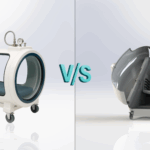Advancements in technology, particularly in the field of artificial intelligence (AI), have the potential to revolutionize various aspects of healthcare. One area that shows promise is wellness and alternative healthcare, where AI can enhance treatments like ozone therapy. This article explores the future role of AI in promoting wellness through ozone-based therapies, highlighting their potential benefits, challenges, and ethical considerations.
Understanding Ozone Therapy and Ozone Steam Saunas:
Ozone therapy involves the controlled administration of ozone, a reactive form of oxygen, to promote healing and enhance overall wellness. It can be administered through various methods, such as intravenous infusion, insufflation, or through ozone saunas. Ozone steam saunas combine the therapeutic effects of ozone and steam, offering a relaxing and detoxifying experience.
The Potential of AI in Ozone Therapy and Ozone Steam Saunas:
- Personalized Treatment Plans: AI algorithms can analyze vast amounts of patient data, including medical history, genetic information, and lifestyle factors, to develop personalized treatment plans for ozone therapy. By considering individual characteristics, AI can optimize the effectiveness and safety of ozone-based treatments.

- Treatment Monitoring: AI-powered devices and sensors can monitor patients during ozone therapy sessions. These intelligent systems can detect vital signs, track physiological responses, and provide real-time feedback to healthcare professionals. This constant monitoring ensures the well-being of patients and allows for immediate intervention if any adverse reactions occur.
- Predictive Analytics: AI algorithms can analyze data from ozone therapy sessions, patient outcomes, and research studies to identify patterns and correlations. This can help predict the effectiveness of ozone therapy for specific conditions, determine optimal dosage levels, and enhance treatment protocols.
- Patient Education and Empowerment: AI-based platforms can provide patients with comprehensive information about ozone therapy and ozone steam saunas. These platforms can deliver personalized educational content, answer questions, and address concerns, empowering individuals to make informed decisions about their wellness journey.
Challenges and Ethical Considerations:
- Data Privacy and Security: The use of AI in wellness and alternative healthcare relies heavily on patient data. It is crucial to ensure that data collection, storage, and analysis adhere to strict privacy and security regulations to protect patients’ sensitive information.
- Quality Assurance and Ethics: The integration of AI into ozone therapy and ozone steam saunas requires robust quality assurance protocols and ethics. Establishing standardized guidelines and certification processes can help ensure the safety, efficacy, and ethical use of AI-powered wellness technologies.
- Human Oversight: While AI can automate many aspects of ozone-based treatments, it is essential to maintain human oversight and expertise. Healthcare professionals should collaborate with AI systems to make informed decisions, provide compassionate care, and address complex patient needs.
In conclusion, the future role of AI in wellness and alternative healthcare holds immense potential. Through personalized treatment plans, treatment monitoring, predictive analytics, and patient education, AI can enhance the effectiveness, safety, and accessibility of these therapies. However, it is crucial to address challenges related to data privacy, regulation, and the need for human oversight to ensure ethical and responsible integration of AI in the wellness industry. With careful implementation, AI has the ability to revolutionize the way we approach wellness and alternative healthcare, improving outcomes and empowering individuals to take control of their well-being.







Leave a Reply